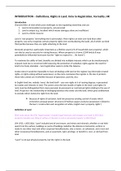INTRODUCTION – Definitions, Rights in Land, Intro to Registration, Formality, HR
Introduction
Characteristics of land which pose challenges to law regulating ownership and use:
1. Land is immovable (real property, not personal)
2. Land is unique (e.g. location) which means damages alone are insufficient
3. Land is a finite resource
Land is ‘real property’ (everything else is personalty). More rights can exist over land than other
property. Law only recognizes certain property rights (not overburdening the land), all of which can bind
third parties because they are rights attaching to the land.
Domestic property is particularly important as a lifetime asset (2/3 of households own property), which
can also be used as security for raising finances. Where property is a home, ECHR Article 8 may
potentially be influential (everyone has the “right to respect for ... his home”).
To maximise the utility of land, benefits are divided into multiple interests which can be simultaneously
enjoyed; land law is concerned with balancing the protection of subsidiary rights against the need for
land to be freely alienable – land registration seeks to strike this balance.
Cooke notes it would be impossible to have all dealings with land on the register (eg informally-created
rights, or rights arising without awareness), so the more conclusive the register is, the less it protects
those who cannot use it (whether because of ignorance, poverty, etc).
In English land law, nobody ‘owns’ the land itself – you own rights in it of varying degrees, represented
by estates and interests in land. The owner owns the best bundle of rights in the land. Land rights (in
rem) must be distinguished from mere personal (in personam) or contractual rights relating to the use of
land. Property is the relationship of belonging between the owner and the land, which gives entitlement
to exclude others below the right from the land.
Because of rights of exclusion, land law preserves existing control of assets which
entrenches unequal power structures (O’Sullivan argues exclusive possession is linked to
the law’s ‘construction and recognition of white, English men’s property rights’)
Definition of Land
Brief note about the LPA: ‘legal estates’ includes legal interests and charges over land (s 205(1)(x);
property includes any thing in action or interest in real or personal property (s 205(1)(xx)).
LPA 1925, s 205(1)(ix): ‘Land’ includes land of any tenure, and mines and minerals, whether or not held
apart from the surface, buildings or parts of buildings (whether the division is horizontal, vertical, or
made in any other way) and other corporeal hereditaments; also a manor, an advowson, and a rent and
other incorporeal hereditaments, and an easement, right, privilege, or benefit in, over, or derived from
land
“Land” is not just physical property, but the rights in the land.




